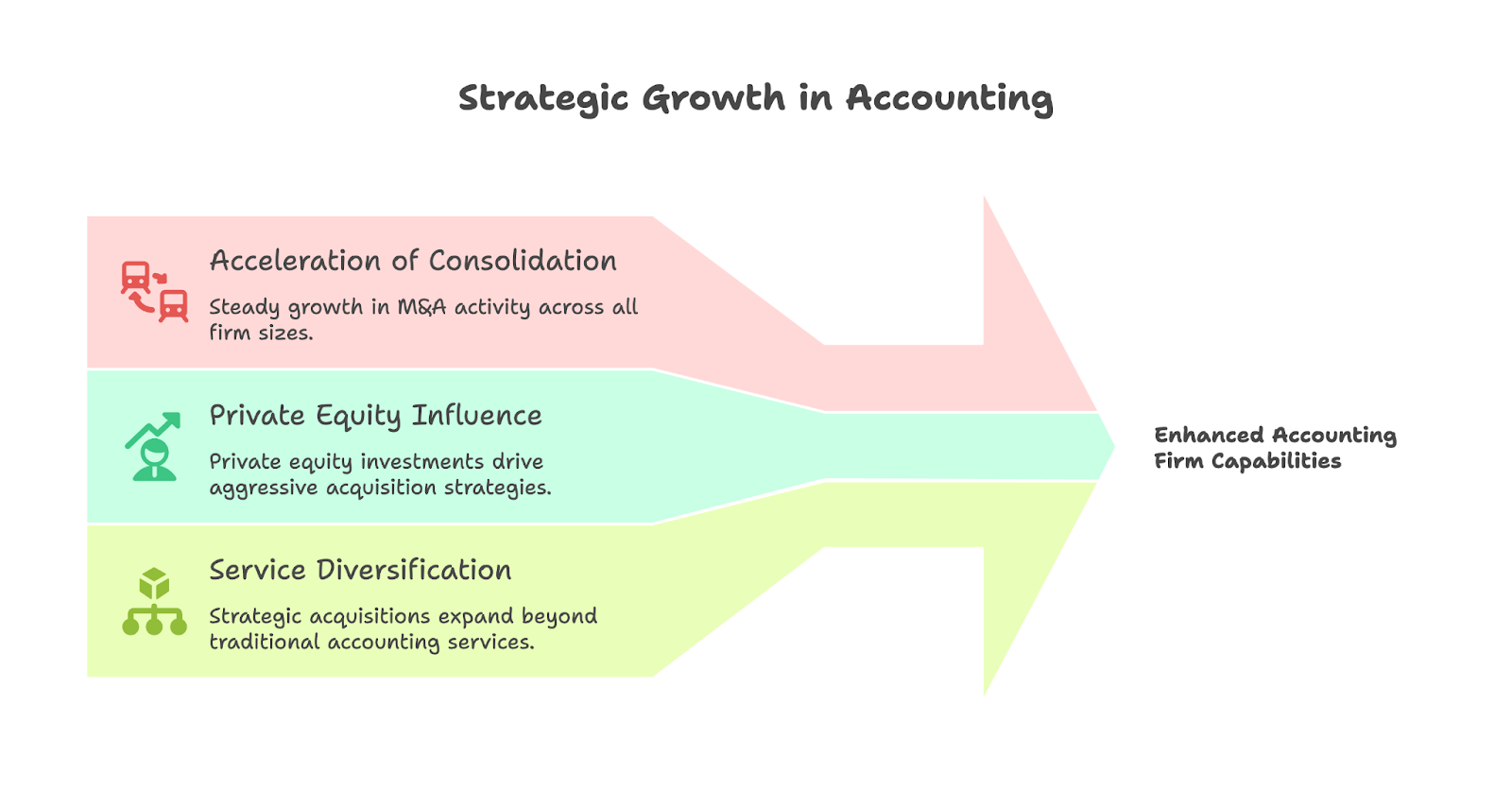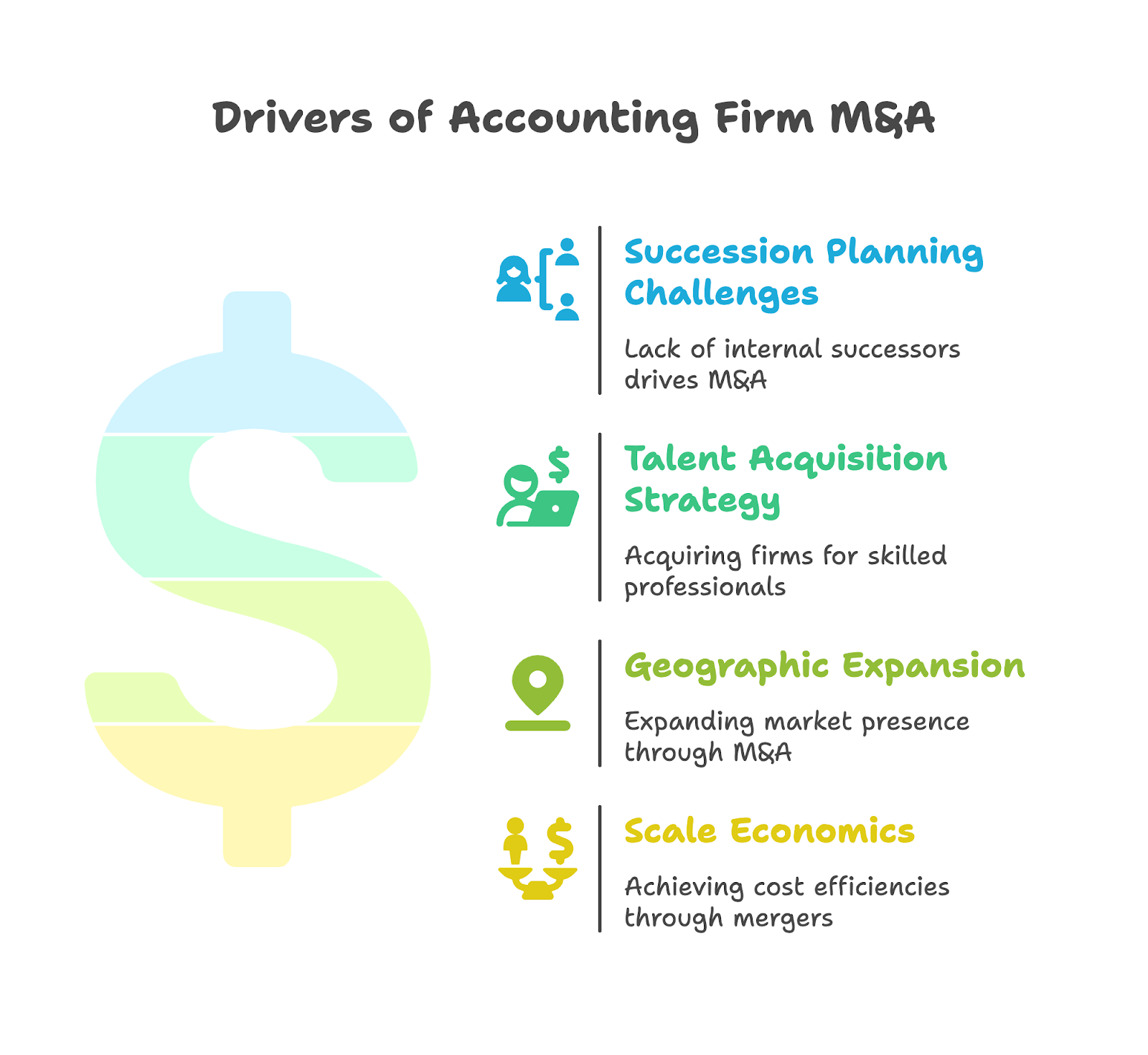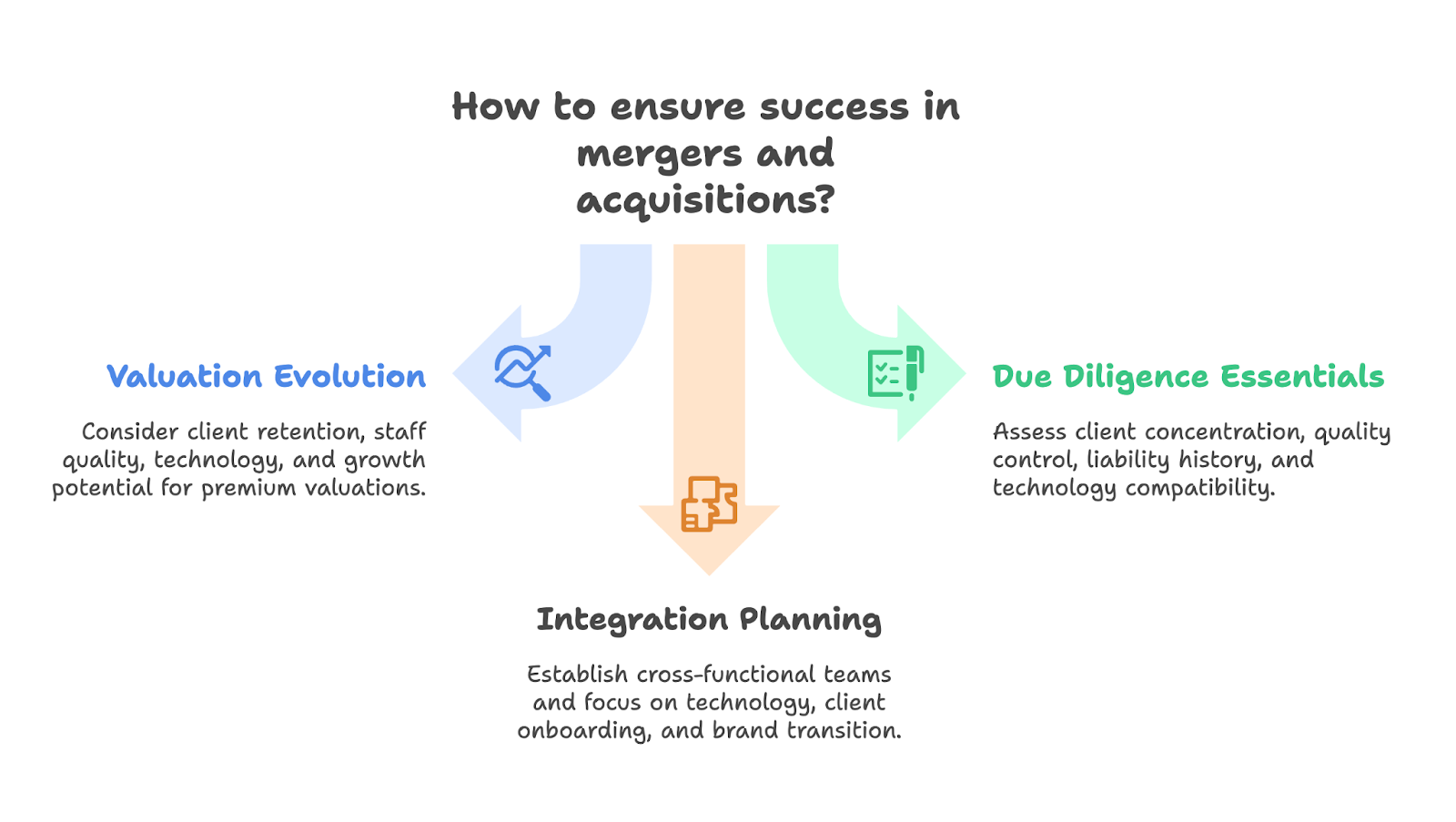The accounting industry is experiencing unprecedented transformation through strategic mergers and acquisitions. Accounting firm mergers and acquisitions have become the primary vehicle for growth, talent acquisition, and service diversification as firms navigate an increasingly competitive marketplace. From small local practices to top 100 firms, organizations across the spectrum are leveraging M&A to strengthen market position and achieve economies of scale.
The accounting industry has reached record levels of consolidation activity. According to Accounting Today, M&A activity has grown steadily over the past decade with no signs of slowing. This surge spans all firm sizes, with even top 25 firms like Moss Adams, CohnReznick, and Grant Thornton actively participating in strategic combinations to expand geographic footprint and enhance service capabilities.
The most significant development in accounting firm M&A has been private equity investments entering the space. Notable examples include New Mountain Capital's investment in Citrin Cooperman, enabling aggressive acquisition strategies. Private equity backing has transformed firms like Aprio and Forvis, allowing rapid growth through strategic acquisitions. Major players like Blackstone view the accounting industry as attractive due to steady cash flows, recurring revenue models, and consolidation potential.
A key driver of accounting firm mergers and acquisitions is expanding beyond traditional accounting and audit services. As technology automates routine tasks, firms seek higher-margin advisory services through strategic acquisitions. This includes capabilities in cybersecurity, data analytics, wealth management, and industry-specific consulting, allowing firms to offer comprehensive service suites under one roof.

Succession planning remains a persistent driver of M&A activity. As firm owners approach retirement, many lack internal successors with financial capacity and management skills. According to the AICPA, this demographic reality creates a robust seller's market, particularly for small to mid-sized firms seeking viable exit strategies while ensuring client continuity.
The shortage of qualified accounting professionals makes talent acquisition a primary M&A motivation. When organic growth is constrained by hiring difficulties, acquiring established firms with experienced teams becomes attractive. This is particularly evident in specialty areas like data analytics, technology consulting, and ESG reporting, where specialized teams command premium valuations.
Regional firms seeking new market entry often find acquiring established local practices provides immediate credibility and client relationships. National firms like Armanino have used mergers to establish nationwide footprints, while others like Berdon strengthen metropolitan market positions. Geographic expansion through M&A serves increasingly dispersed client needs.
Pursuing scale economies drives many accounting firm mergers and acquisitions. Larger firms have advantages in regulatory compliance, technology investments, and specialized resources. Combining operations allows cost spreading across larger revenue bases, improving profitability through back-office consolidation, staff optimization, and service delivery standardization.

Recent years have seen transformative accounting firm mergers reshaping the competitive landscape. The Forvis creation through BKD and Dixon Hughes Goodman merger represents one of the profession's largest combinations, instantly creating a top 10 national firm. CohnReznick's private equity-backed acquisition strategy demonstrates rapid growth through multiple strategic combinations.
Beyond headline deals, significant regional consolidation occurs as middle-market firms combine for competitive positioning. These combinations focus on cultural alignment and service complementarity, allowing merged entities to achieve critical mass for specialized investments previously unattainable independently.
The M&A market now includes non-traditional buyers reshaping acquisition patterns. Technology companies acquire accounting practices for vertical integration, while outsourced providers like Acuity pursue scale-building strategies. Private equity-backed platforms offer premium valuations and attractive terms, broadening transaction structure options for firm owners.
Valuation methodologies in accounting firm mergers and acquisitions have evolved beyond simple revenue multiples. Sophisticated buyers consider client retention rates, staff quality, technology infrastructure, and growth potential in high-value services. Firms with advisory components, specialized expertise, or proprietary technology command premium valuations compared to traditional compliance-focused practices.
Effective due diligence requires examining both quantitative metrics and qualitative success factors. Beyond financial analysis, thorough assessment includes client concentration risks, quality control systems, professional liability history, and employee retention factors. Technology and cultural due diligence have become critical components, evaluating tech stacks, security practices, and compatibility of work styles and values.
Successful accounting firm mergers and acquisitions depend on effective integration planning and execution. Leading firms begin integration planning during due diligence, establishing cross-functional teams with clear accountability. Critical workstreams include technology systems, client onboarding, staff training, and brand transition, with particular attention to client communication strategies for relationship maintenance.

Technology serves as both driver and challenge in accounting firm M&A. Firms with outdated systems may find merging with technologically advanced organizations attractive, while sophisticated firms seek acquisitions to maximize technology investment returns. However, integrating disparate systems requires careful planning and significant investment, often determining merger success.
Technology due diligence now includes detailed assessment of tech assets and capabilities, with integration planning focused on leveraging these assets for enhanced client service and operational efficiency. As digital transformation accelerates, technology considerations become increasingly central to merger strategy and execution.
All indicators suggest robust accounting firm mergers and acquisitions activity will continue. Demographic trends, technology imperatives, competitive pressures, and capital availability point toward ongoing consolidation. The middle market appears particularly ripe for continued activity, with regional firms seeking scale to compete with larger nationals.
New combination approaches offer alternatives to full integration. Alliance structures, network affiliations, and partial acquisitions provide scale benefits without complete organizational combination. Innovation in transaction structures addresses specific ownership transition challenges through employee ownership trusts, phantom equity arrangements, and partial liquidity solutions.
Specialization increasingly drives accounting firm mergers and acquisitions as firms with deep industry or service niche expertise command premium valuations. Forward-thinking firms use M&A to build specialized capabilities rather than simply adding scale, particularly in high-growth areas like ESG reporting, data analytics, and technology consulting.
Successful accounting firm mergers and acquisitions demonstrate strong leadership alignment, clear strategic objectives, and comprehensive integration planning. The "one firm" philosophy, operating as truly integrated entities rather than separate practices under common brands, correlates strongly with positive outcomes. Conversely, failures often stem from cultural misalignment, inadequate due diligence, or unrealistic integration expectations.
Client retention strategies during transitions remain critical, requiring proactive communication emphasizing benefits from expanded capabilities and enhanced resources. Successful firms develop comprehensive communication plans involving client-facing professionals from both organizations to maintain relationship continuity and build confidence.
The accounting firm mergers and acquisitions landscape continues evolving rapidly, driven by succession challenges, talent shortages, technology imperatives, and competitive pressures. Private equity involvement has introduced new transaction structures and growth capital, while specialization increasingly determines valuation premiums.
For firm owners contemplating transactions, success requires understanding these dynamics, thorough preparation, clear strategic objectives, and strong leadership alignment. Whether positioned as buyers or sellers, firms that approach accounting firm mergers and acquisitions with strategic intent, comprehensive due diligence, and thoughtful integration planning will best leverage these transactions for growth, capability development, and long-term competitive advantage in the increasingly consolidated accounting profession.
The primary drivers include succession planning challenges as firm owners approach retirement, talent acquisition in a tight labor market, geographic expansion needs, pursuit of scale economies, and the desire to expand beyond traditional accounting services into higher-margin advisory areas.
Private equity firms have introduced new investment models that separate attest practices from advisory services, enabling outside investment while maintaining regulatory compliance. This has created alternative exit strategies for firm owners and provided capital for aggressive growth through multiple acquisitions.
Effective due diligence should examine client concentration risks, quality control systems, professional liability history, employee retention factors, technology infrastructure, and cultural compatibility. Both financial metrics and qualitative factors that influence post-merger success are critical.
The main challenges include integrating different technology systems, aligning compensation structures, managing cultural differences, standardizing workflows and processes, and maintaining client relationships during the transition period.
Valuation has evolved beyond simple revenue multiples to consider client retention rates, staff quality, technology infrastructure, growth potential in high-value services, and specialization. Firms with advisory components and specialized expertise typically command premium valuations.
Future trends include continued consolidation across all firm sizes, emergence of alternative combination structures like alliances and partial acquisitions, increasing importance of specialization in driving valuations, and growing influence of private equity in creating new transaction models.
Your expertise deserves better support. Madras Accountancy partners with forward-thinking CPA firms and fractional CFOs to deliver world-class accounting services through our experienced offshore teams. We handle the heavy lifting while you focus on strategic advisory work that drives real value for your clients. Ready to experience the power of true partnership? Let's explore how we can amplify your success.

A practical comparison of hiring a freelancer vs using a dedicated offshore accounting team, focusing on continuity, quality control, security, and scaling.

How CPA firms outsource payroll and 1099 work to reduce penalties and admin load, with a clean workflow for approvals, filings, and year-end reporting.

Practical do's and don'ts for CPA firms outsourcing accounting work, based on common failure points and what successful rollouts do differently.